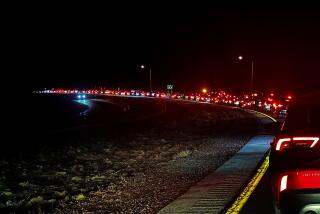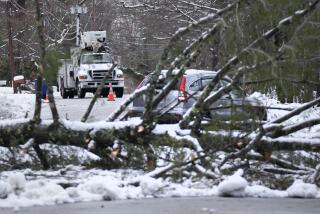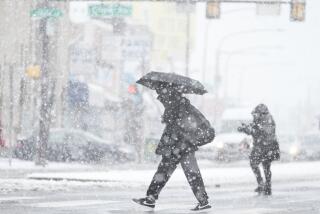Northeast Still Gripped by Glacial Cold
HINGHAM, Mass. — Appi, a 14-year-old bichon frise, placed one pedigreed paw out her front door Thursday morning, then turned to her dog-walker with a frosty glare that said: No way.
The temperature in this small colonial seaport south of Boston was 2 degrees, but with the wind chill it felt like minus 20.
The same numbing conditions prevailed across the region as a cold front from Siberia continued to grip the Northeast on Thursday. Meteorologists said the icy weather would only worsen today.
New Hampshire Fish and Game officials said a hiker was found dead Thursday in the White Mountains, where temperatures fell to minus 44 and the wind chill approached minus 100. Friends said the middle-age man had been outdoors since Monday.
In Caribou, Maine, the temperature was minus 10. Atop Mt. Washington in New Hampshire, the thermometer at midday hovered at minus 34 degrees; with the wind chill it dropped as low as minus 102. In Burlington, Vt., the temperature was minus 9, but wind chill made it feel much colder.
Temperatures in Boston began at well below zero, edging up as the sun teased the city with a brief midday appearance. Steady winds made the Siberian-import air feel even colder. By Thursday evening, temperatures across the region again dropped below zero.
“For the Boston area, this is the coldest wave of weather in at least the last 50 years,” said Rob Gilman, a meteorologist in the coastal community of Hull. “If you want to warm up, you go to Alaska.”
Temperatures across the Northeast were so cold they made the inside of a meat locker (15 degrees) seem downright tropical.
At the weather observatory atop Mt. Washington -- New England’s highest peak -- summit manager Pete Sweeney said at noon on Thursday the thermometer read 34 below zero. Wind gusting between 70 and 90 miles per hour brought the temperature to minus 102.
Sweeney said that by Friday, the temperature probably would plummet below the record low of minus 47 degrees set in 1934.
In Maine, frigid conditions prompted Gov. John E. Baldacci to declare a civil emergency. The measure allowed fuel oil and propane drivers to circumvent federal regulations so they could work overtime to make emergency deliveries.
Thursday’s brutal weather did not keep a Jewish community in Bangor, Maine, from predawn worship. Sixty families pray daily at Congregation Beth Abraham, said Sandy Podolsky, a member of the synagogue for more than 60 years. On the Sabbath, the families walk to their service, regardless of weather.
“During the week, actually, we drive,” Podolsky said. “If our cars start, we’ve got it made.”
Podolsky said when he left his house to go to temple just after 6 a.m. on Thursday, the temperature was minus 16 with a wind chill that brought the thermometer down another 20 degrees.
“We have never had it this cold,” Podolsky said. “It is hard to know whether this is testing our souls, proving our faith or just plain cold.”
At New York airports, more than 200 flights were canceled Thursday because of the weather. Parts of New York state, New Jersey and Connecticut reported weather-related school closings. New York City authorities received more than 2,000 complaints Thursday about inadequate heating.
In the Boston area, hundreds of schools said they would close today -- some because cold weather Thursday had caused fuel to congeal in school buses.
The Boston-area Red Cross also reported that blood supplies were at a dangerously low level because donors were staying away as a result of the cold.
The Southern New England office of the American Automobile Assn. logged 9,500 road assistance calls as of late Thursday, said Dave Vitolo at AAA Rhode Island headquarters. “We are still very busy; the calls are just pouring in,” Vitolo said.
On a day when the high temperature never broke single digits, dog-walker Jerry Elsden eventually coaxed Appi, the recalcitrant canine, out the door. Later, leading a quartet of retrievers through Hingham’s town forest, Elsden said: “For me, it’s just layer, layer, layer -- keep moving -- and stay out of the wind.”
Though malls and grocery stores were largely deserted, the extreme cold was a minor boon to Mark di Lorenzo, a furrier in Easton, 24 miles south of Boston. Di Lorenzo said fur coats were moving well, and cold-weather accessories were doing even better.
“We’re selling a lot of fur headbands, earmuffs, hats -- anything to keep the head warm,” Di Lorenzo said.
To stay warm Thursday as he cycled about Boston on his daily deliveries, bike messenger Kevin Rheault was a study in cold-weather fashion science. Rheault, who works for a service called Fly Over the City, said he wore wool underwear -- “really thin and really warm” -- under a pair of heavy, work-style jeans. He layered light ski socks under a pair of waterproof socks.
On top he wore a long-john undershirt, a wool sweater and what he called a high-tech raincoat, as “this black hood thing that kind of makes me look like a Cobra commando.” Rheault then put on a hat, gloves and mittens.
“And I was all right,” he said. “The only part of me that got cold was when my eyes teared up and the teardrops froze on my eyelashes.”
Forecasters predicted slight relief for the area by Saturday, when an air rotation from Newfoundland could drive temperatures into the mid-20s.
“You know we’re desperate when we’re looking forward to a weather pattern from Newfoundland,” meteorologist Gilman said.
The prediction of a warmer weekend came as welcome news to fans of the New England Patriots, who will play at home in suburban Foxboro for the AFC football championship against the Indianapolis Colts on Sunday.
Patriot players and their fans have already suffered through a 4-degree divisional playoff game Saturday against the Tennessee Titans. Players stayed warm by hunkering on heated benches or moving close to propane heaters on the sidelines. The Patriots won, 17-14.
But as the cold sliced through the Northeast, aircraft parts salesman George Fitzgerald and his 15-year-old nephew shared a sunny golf course south of Miami with a flock of ibis.
“A day like today, you really want to enjoy,” said Fitzgerald, 46, “because you know how they are suffering up there.”
Times staff writers Josh Getlin in New York, John-Thor Dahlburg in Miami and Sam Farmer in Foxboro, Mass., contributed to this report, as did researcher Lynn Marshall in Seattle.
More to Read
Sign up for Essential California
The most important California stories and recommendations in your inbox every morning.
You may occasionally receive promotional content from the Los Angeles Times.










